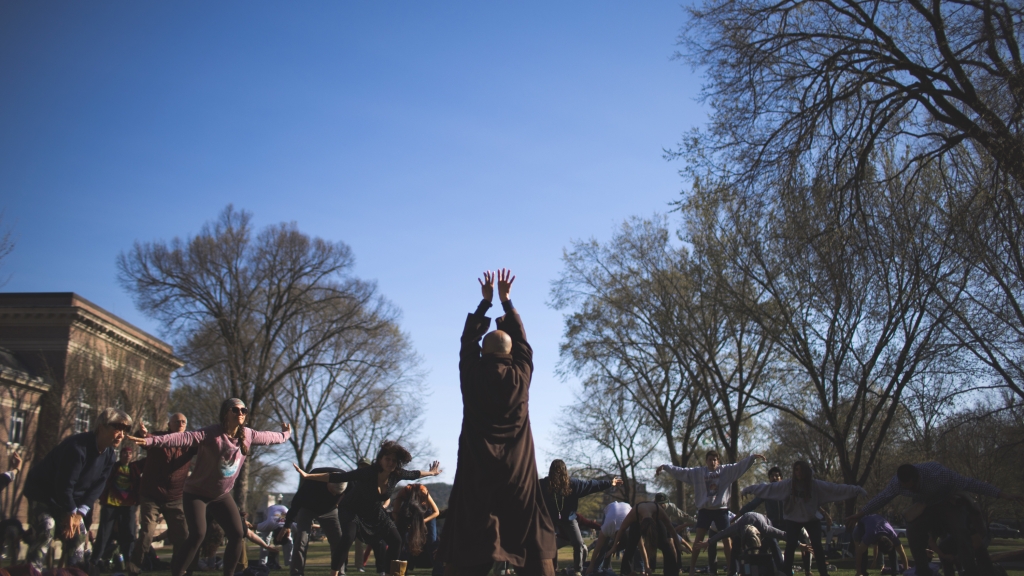For the second year running, Dartmouth is offering a weeklong exploration of mindfulness with senior monastic teachers in the Plum Village tradition of scholar, poet, peace activist, and Zen master Thich Nhat Hanh.
Embodying Mindfulness: A Week of Monastic Wisdom at Dartmouth, set for April 22 to 28, will include classroom visits, meditation practice, lectures, and retreats led by teachers from Deer Park Monastery in California and Magnolia Grove Monastery in Mississippi, who will share strategies for applying mindfulness to challenges in everyday life.
"We are so fortunate to have 11 monastics share their wisdom and mindfulness practice with the Dartmouth community," says Diane Gilbert-Diamond '98, an associate professor of epidemiology, medicine, and pediatrics and one of the organizers of the visit. "Last year, many community members expressed how meaningful it was to witness the profound peace and happiness that the monastics embody."
The residency is being presented by the Student Wellness Center, William Jewett Tucker Center, Geisel School of Medicine, and members of the Mindful Dartmouth Initiative, a group of staff, faculty, alumni, and students working to promote mindfulness-based practices and principles throughout the extended Dartmouth community.
A Vietnamese Buddhist Zen master, Thich Nhat Hanh was known internationally for his bestselling writings on mindfulness and peace and for spreading the engaged Buddhism movement, which employs Buddhist teachings to bring about social change.
Novices and skilled practitioners alike are invited to join in the activities, which address topics such as mindful eating, climate hope, and peace and reconciliation, and include qigong, walking and seated meditation, deep relaxation sessions, and community meals. Registration is required for meals and retreats.
"We know from research that these practices are one way in which members of our community can reduce stress and anxiety, increase mental focus, build self-compassion, enhance compassion for others, improve communication, foster interpersonal relationship skills, and gain other individual and community benefits," says Caitlin Barthelmes, director of the Student Wellness Center.
Last year, 10 monks and nuns, including Brother Phap Luu '97, formerly Douglas Bachman, who will return again this year, spent a week on campus leading discussions and sharing meditation practices and meals with participants. More than 1,000 people from the Dartmouth and greater Upper Valley communities took part.
The Rev. Nancy Vogele '85, chaplain and director of the Tucker Center, says the 2023 residency was "incredibly transformative" for students, staff, and faculty, as the monastics helped them not only learn about mindfulness and happiness, but actually experience what it was like to be mindful and happy.
"Their deep happiness helped us tap into our own happiness," Vogele says. "It was so beautiful to watch this happen over the course of the week. I know that this year's visit will build on last year's and make Dartmouth a more mindful place."
Phap Luu says he and his monastic brothers and sisters are looking forward to returning to Dartmouth which, with its beauty, walkability, and "humanness," feels like a natural place to practice mindfulness.
Seeing students, staff, and professors stream into Rollins Chapel for morning meditation, "it was like the whole campus was designed for it somehow," he says.
And they're excited for another opportunity to participate in the life of the university, and to contribute something positive.
"Meditation is not a solo endeavor as many people believe, but it's actually something that helps us reaffirm our deep interconnection with each other," Phap Luu says. "By that kind of radical act of sitting and following our breath, we affirm our shared humanity and build community."
Barthelmes notes that the residencies reflect priorities laid out in Commitment to Care, Dartmouth's strategic plan for student mental health, such as integrating opportunities to build self-awareness throughout the Dartmouth experience and centering well-being inside and outside the classroom.
And, she says, "the honored guests' visit will shine a light on the robust, ongoing practice opportunities available here at Dartmouth for students, staff, and faculty to build self-awareness skills."
The upcoming residency sets the stage for "Mindful May," a component of Mental Health Action Month that invites Dartmouth students, staff, and faculty into mindfulness practices offered by MDI members and organized by the Student Wellness Center and Wellness at Dartmouth.
Additional cosponsors include Biology 3: Mindful Physiology; the Office of the President; Office of the Vice Provost for Academic Affairs; Design Initiative at Dartmouth; Thayer School of Engineering; Tuck Compass; Guarini School of Graduate and Advanced Studies; Dartmouth Sustainability Office; Irving Institute; Hopkins Center for the Arts; Dartmouth Center for the Advancement of Learning; the House Communities; and Wellness at Dartmouth.
